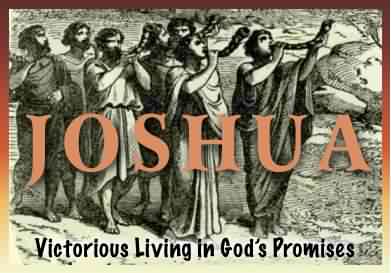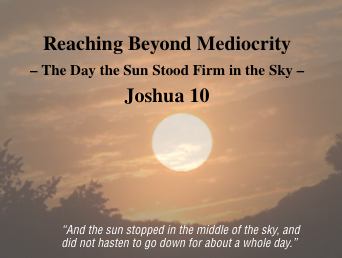|
|
Joshua 10:1-43
– The Day the Sun Stood Firm in the Sky –
– A Life Commentary –
True success depends upon our willingness to live for God's purposes rather than our own. At different points in our lives, we will be exposed to certain circumstances in which God allows us to choose to please our own selves or pursue God's best. Joshua gives us an excellent example on how to make the best decisions by focusing getting God's great works done in and through our lives.
Skepticism and Bible Criticism
Many people have not thoroughly read the Bible. Sometimes, though, because they have heard of one particular passage and perhaps a critical comment with it, have totally disregarded the value and authority of the scriptures. This same issue comes up again and again among skeptics. “You mean you believe in the Bible!” “That’s impossible.” One can easily wonder why is it that the Lord put these kind of passages in the Bible at all. Would not the world be that much closer to the Lord and open to the scriptures if passages that seemed so extreme were not in the Bible? But this is man’s reasoning and very limited.
For instance, we could easily go and make the Bible much more acceptable to the public if we took out all the miracles. Thomas Jefferson, the principle writer of the US constitution, did this in the Jefferson Bible. He believed that the highest ethics available was taught in the Bible but carefully eliminated the religious and miraculous components. People don’t understand that ethics is derives from the Lord Himself.
Secularists don’t like these miracles. They don’t have room for them in their world view. God is not happy with such endeavors. One of the last verses of the Bible in Revelation says,
I testify to everyone who hears the words of the prophecy of this book: if anyone adds to them, God shall add to him the plagues which are written in this book; and if anyone takes away from the words of the book of this prophecy, God shall take away his part from the tree of life and from the holy city, which are written in this book. (Revelation 22:18, 19, NASB).
I have come to respect every part of the Bible even if I do not understand it. Instead of acting pridefully and with skepticism, I begin to treasure every word even as Jesus Christ did.
Do not think that I came to abolish the Law or the Prophets; I did not come to abolish, but to fulfill. “For truly I say to you, until heaven and earth pass away, not the smallest letter or stroke shall pass away from the Law, until all is accomplished. “Whoever then annuls one of the least of these commandments, and so teaches others, shall be called least in the kingdom of heaven; but whoever keeps and teaches them, he shall be called great in the kingdom of heaven. (Matthew 5:17-19, NASB).
Jesus was convinced of the value of all the Word of God. He even says every letter and stroke is important. Plead ignorance to God’s purpose of writing different parts of the Bible and confess you are not sure of its relevance to your life, but dare not arrogantly accept the criticism that is thrown at the Word of God.
We can pray for people. We can proclaim God’s Word. But there will always be critics. For decades people mocked Noah and the building of the ark. None of it made sense–building a huge boat on land without trailers and 18 wheelers to move it. Noah was faithful and the skeptics of his day could not thwart him from building the ark as God commanded.
So what incident recorded in the Bible has been flung about in our skeptical society probably more than any other? I can only come away from this with a holy awe of God’s choice to include it. As far as I am concerned, this makes the incident that much more important. God was willing to allow His precious Word to be mocked through the ages just so that we could have this message. I hope we all pay close attention to it. We will find the passage that we are discussing in Joshua 10.
Then Joshua spoke to the LORD in the day when the LORD delivered up the Amorites before the sons of Israel, and he said in the sight of Israel, “O sun, stand still at Gibeon, And O moon in the valley of Aijalon.” So the sun stood still, and the moon stopped, Until the nation avenged themselves of their enemies. Is it not written in the book of Jashar? And the sun stopped in the middle of the sky, and did not hasten to go down for about a whole day. And there was no day like that before it or after it, when the LORD listened to the voice of a man; for the LORD fought for Israel. (Joshua 10:12-14).
Skeptics often bring it up to destroy people’s faith. This is interesting because the whole incident here in Joshua 10 is purposely recorded in the scripture to establish the faith of the believers. Through this one incident the Lord wants to strengthen our faith so that we will never fail in trusting God’s ability to get His great things done.
Skeptics are known for their doubt. By knowing a few things, they suppose they know a lot. This is the source of the problem of many critics. The scriptures have shown themselves to be very accurate through the ages. Charges of inaccuracy have been regularly brought against the Bible.
The Gospel of Judas.
Just this week (it is typical the hostile press releases such skeptical reports just before Easter) the press hails the new translation of a 300 AD Gnostic text as a challenge to what the four gospel writers wrote. They suggest that the book’s viewpoint might be more accurate than the four gospels. The Gospel of Judas presents Judas Iscariot as a good guy. The press is unprincipled in their articles for they do not allow the readers to evaluate that the reliability of the Gospel writers. They were four in number rather than one. The Gospels were consistent stories and served as eye-witnesses to the events at the time. This is in total contrast to the other unknown writer who lived hundreds of years after Jesus’ time and was knowingly heavily influenced by a cult known as Gnosticism. Who is interested in the accuracy? They have to resort to such tactics because the Bible has shown itself to be very accurate to all the charges against it.
Jericho’s walls.
One charge used the findings of the walls of Jericho to suggest the Bible's unreliability. The early 1900s archaeologist’s report said that the scene had no resemblance to what was said in the scriptures. But if you studied the details of the report of what she saw, then we would conclude quite different. She and other teams actually found the fallen walls just as the scripture stated. No one would expect walls to fall outward forming a path into the city but this is the way this wall fell.
Documentary Theory (JEPD).
Skeptics are not looking for truth but for ways to keep the truth of God from them!
Earlier in the 1900s, one skepticism that catapulted the documentary theory (JEPD) into prominence and acceptance was that there was no writing back in Moses’ time. With this assumption, we could easily see how they would come up with theories explaining who later wrote the first five books of the Bible and the editing process they went through. Now of course that assumption that there was no writing back around 1500 BC has been proven false and that Moses with his high education in the Egyptian court certainly could have written the Pentateuch. But that sentiment and doubtful and critical approach of examining the scriptures was so integrated in the skeptics minds that they persisted in their beliefs, even when their foundational assumption was shown to be in error. This only points out that the skeptics are not looking for truth but for ways to keep the truth of God from them!
The Resurrection of Jesus Christ.
The last charge against the Bible's reliability that I now mention is the charge that Jesus did not rise from the dead. We could of course ask the skeptic, “How do you know that it did not happen?” There have been several critics who tried to prove Christianity was wrong by showing that the resurrection was not an historical event. I have one such book by Frank Morrison. This lawyer was careful in his research but when he looked at the facts as presented in the four Gospels, he found that the claim and presentation perfectly matched. He became a believer.
But let us return and find what great teaching the Lord holds here in Joshua 10. It was so important that the Lord would give ammunition to the critics for hundreds of years. He knew this but would still reveal the truth about what happened on that eventful day.
Before going on, though, perhaps we should take a moment to describe various interpretations of this extended day.
Next > What really happened on that day?
|
Mobilizing God's People (Joshua 1:10-18)
Joshua 1:10-18: Introduction to Moblizing God's People
Joshua 1:10-11: A. Communicates God’s Will Joshua 1:12-15: B. Demands Total Participation Joshua 1:16-18: C. Responds With A Clear Commitment Joshua 1:10-18: Bible Study Questions |
|
|
Victory over Strongholds (Joshua 6:1-27)
Joshua 6:1-27 The Lesson from Jericho Joshua 6:1 Our Need for God's Power Joshua 6:2-5 Our Discovery of God's Solutions Joshua 6:6-27 Our Participation in God's Victory Joshua 6:1-27 Summary: You can win too! Joshua 6:1-27_Bible_Study_Questions |
Other Articles on Biblical Leadership |
|
Effectively Dealing with Defeat & Despair (Joshua 7:1-15)
Joshua 7:1-15: Learning about Defeat and Failures Joshua 7:1-5: Falling into Failure Joshua 7:6-10: Staying in Disgrace Joshua 7:11-15: Road to Recovery Joshua 7:1-15: Bible Study Questions |
Other Related topic on Overcoming Failure
Discouragement & Depression: Its Causes and Solutions
Overcoming Sexual Sins
Failing to WaitFrom Revival to Despair (Psalm 106) Living around Postmodern Despair (Micah 4) Observing how the Evil One Causes Despair |
| Reaching Beyond Mediocrity (Joshua 10:1-43) – The Day the Sun Stood in the Sky – Skepticism and Higher Bible Criticism Joshua 10:12-14 Interpretations of the 'Sun stood in the sky.' Joshua 10:12-14 Purpose of Recording the Miracle Joshua 10:1-11: A. Joshua's Sincere Obedience Joshua 10:12-43: B. Joshua's Quest for God's Best Joshua 10:1-43: Bible Study Questions |
Other Related topics
|
BFF Homepage | Top | Back | Bible Topics | Joshua intro | Joshua 10 Questions | Next
Biblical Foundations for Freedom
Rev. Paul J. Bucknell
NASB used unless noted

